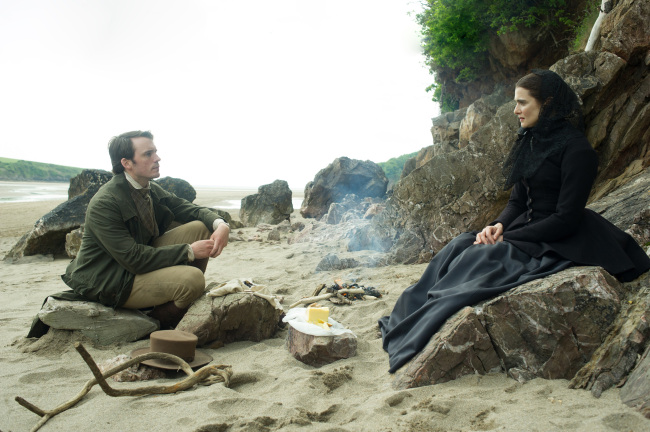Director Roger Michell has tackled many different genres in his long career, including romantic comedies, dramas and thrillers. “My Cousin Rachel” offers the chance to sink his teeth into a juicy, gothic romantic melodrama, based on a 1951 novel by Daphne Du Maurier. The story was adapted to the silver screen in 1952 with Olivia de Havilland and Richard Burton in the lead roles, and now Rachel Weisz and Sam Claflin tackle the story of passion and paranoia. In this tale, impetuous, distrustful masculinity meets mysterious, veiled femininity, which proves to be a combustible combination on contact.
Though Rachel is an omnipresent figure, this story belongs to Philip (Claflin). His beloved cousin and guardian, Ambrose (Claflin plays both men), retreats to Italy to convalesce, where he meets and marries an intriguing woman, Rachel (Weisz). After his untimely death, his widow arrives at his English estate, where Philip, his only heir, is now man of the house, and highly suspicious of his new relative, thanks to a series of anguished notes from a dying Ambrose. The sheltered young man has whipped himself into a frenzy over her arrival, but it turns out the cousin in question is actually quite beautiful and charming, and soon everything is topsy-turvy.
Weisz gives a performance that is virtuosic in its control. Her face is like the placid surface of a lake, never giving anything away. Is it nefarious? A defense? Both? Her Rachel is highly intelligent, resourceful, guarded, but also playful and compassionate. Claflin gives one of his best performances to date as the petulant Philip, his emotional pendulum swinging constantly from puppyish naivete to sinister anger. Though we see the story through his perspective, Claflin and Michell smartly don’t make his character all too likable; Philip is as dark and complex as the new woman in his life.
 |
Sam Claflin and Rachel Weisz in the film, “My Cousin Rachel.” (Nicola Dove/Fox Searchlight) |
Claflin and Weisz spin a captivating spell, but director Michell, who also adapted the screenplay, carefully balances the perspectives, so you never know quite who to believe. He underscores that with a dramatic, unique film style. Production designer Alice Normington has created a setting that is sensual, earthy and naturalistic, lit with natural light and candles, no stuffy “Downton Abbey” crispness in sight. That sense of realism is juxtaposed with a wild cinematic style from cinematographer Mike Eley, all off-center framing, low canted angles, dramatic tracking shots, and claustrophobic handheld camera for some of the more intense monologues. The cinematic craft of this film is heady and intoxicating, a fever dream.
“My Cousin Rachel” is an operatic melodrama of hidden notes, stolen kisses, family jewels, and love’s first blush, but it’s also a film about the danger of one’s own belief systems, being locked into one way of thinking. It’s a cautionary tale about toxic masculinity: of impulsive and jealous young bucks operating within a patriarchal system controlling women’s independence.
Early on, Rachel expresses a desire to live a modest widow’s life, getting by on her own as an independent woman. For that desire, she is rewarded with suspicion, jealousy and anger.
Her story, as ambiguously as Michell may want to present it, is ultimately about the danger of being a single woman in a world that can’t reconcile that fact. The tangled perspectives of “My Cousin Rachel” illustrate a crucial element of their limits — the only thing stands in the way of the truth is our own understanding.
By Katie Walsh
Tribune News Service
(Tribune Content Agency)








